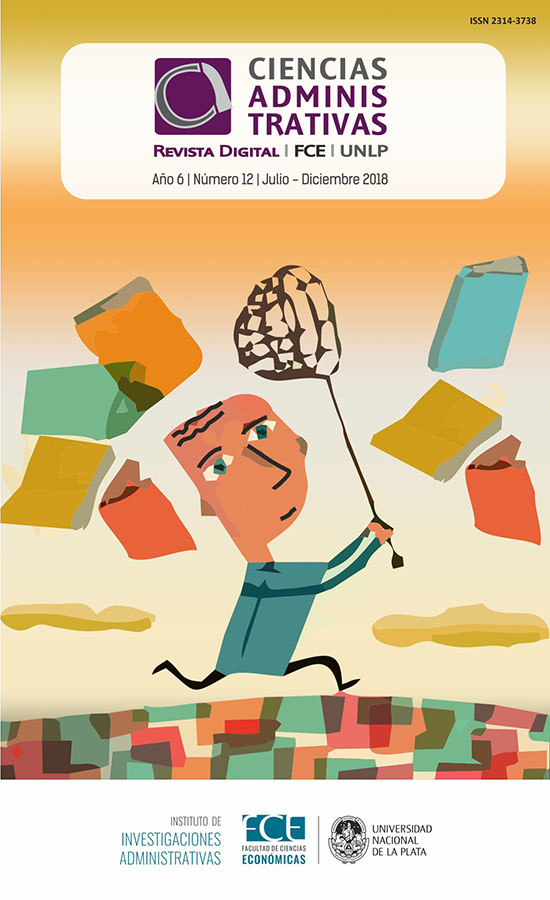Reconfigurations in the university academic area and its impacto on strategic management
DOI:
https://doi.org/10.24215/23143738e023Keywords:
university academic area, contextual changes, strategic managementAbstract
This work is the result of a study about conditioning factors in the strategic decision making processes at the university academic area. From in-depth interviews, made to important actors of the Faculty of Economic and Social Sciences of the National University of Mar del Plata, which is the focus of study, it has considered important to show here the results of the perceptions that members have about the prioritization of such decision-making processes. They will be analyzed in light of the changes that the Public University of Argentina is experiencing, where new variables emerge and make it difficult to think in the long term.
The objective is to produce relevant information that helps strategic management of the teaching team and make possible the sustainability of university policies. It pretends to show the importance of investing time on decisions that have profound long-term impact on all university actors. It is also important to establish clear guidelines that ensure the complete development of teaching profession.
Downloads
Metrics
References
Araiza y Jardines (2012). El liderazgo educativo y las competencias tecnológicas como generadores del cambio, Daena: International Journal of Good Conscience, 7 (3), 82-87
Chiroleu, A. (2002). La profesión académica en Argentina. Revista (Syn) Thesis, 7, 41-52.
Durán, C. y Foutel, M. (2009). Decisiones estratégicas en el área académica: reflexiones acerca del uso de información relevante como base para la definición de un régimen de permanencia. Nülan - Portal de Promoción y Difusión Pública del Conocimiento Académico y Científico
Fernández Lamarra, N., y Coppola, N. (2008). La evaluación de la docencia universitaria en Argentina: situación, problemas y perspectivas.RIEE. Revista Iberoamericana de Evaluación Educativa, 1 (3), 96-123
Foutel, M., Gnecco, M. L. y Poujol Cols. L. J. (2013). Información cualitativa y sistemas de información: necesidad de relevamiento sistemático del clima organizacional por su influencia en la satisfacción y desempeño del docente. Caso: relevamiento cualitativo en el claustro docente de la Facultad de Ciencias Económicas y Sociales. XIII Coloquio Internacional de Gestión Universitaria, Buenos Aires. Sitio web: http://nulan.mdp.edu.ar/2082/1/foutel.etal.2013.pdf
Kepner, C. H. y Tregoe, B. (1989). El nuevo directivo racional. México: Editorial Mc Graw Hill.
Marquina, M. (2012). La profesión académica en Argentina: principales características a partir de las políticas recientes. En N. Fernández Lamarra y M. Marquina (Eds.). El futuro de la profesión académica: Desafíos para los países emergentes (pp. 126-147). Sáenz Peña: EDUNTREF.
Patton, M. Q. (2005). Qualitative research and Evaluation methods. Thousand Oaks, CA: Sage.
Pavesi, P. F. J. (1991). Cinco lecturas prácticas sobre algunos problemas del decidir. Revista Alta Gerencia, I, 1.Pérez Serrano, G. (1998) Investigación cualitativa. Retos e interrogantes. Vol. I. Métodos. Madrid: La Muralla.
Sandoval, M. C. P. (2004). La percepción de los académicos sobre su participación en el gobierno universitario. Investigación, 9(22), 665-691.
Schvarstein, L. (1998). Diseño de organizaciones. Tensiones y paradojas. Buenos Aires: Paidós.
Scribano, A. O. (2008). El proceso de investigación social cualitativo. Buenos Aires: Prometeo Libros Editorial.
Toer, M. (2005). Democracia y representación en la universidad: el caso de la Universidad de Buenos Aires desde la visión de sus protagonistas. Buenos Aires: Biblos.
Walker, V. (2015). Aportes teóricos para pensar el trabajo docente en la Universidad. Revista Actualidades Investigativas en Educación, 15(1), 15-20.
Walker, V. (2013). Evaluación y trabajo docente en la universidad: políticas, prácticas y actores. Estudio de casos en Argentina y España. (Tesis Doctoral). Universidad de Málaga, Málaga, España. Recuperada de http://riuma.uma.es/xmlui/handle/10630/6868.
Downloads
Additional Files
Published
How to Cite
Issue
Section
License
Those authors who have publications with this journal, agree with the following terms:
a. Authors will retain its copyright and will ensure the rights of first publication of its work to the journal, which will be at the same time subject to the Creative Commons Atribución-NoComercial-CompartirIgual 4.0 Internacional (CC BY-NC-SA 4.0) allowing third parties to share the work as long as the author and the first publication on this journal is indicated.
b. Authors may elect other non-exclusive license agreements of the distribution of the published work (for example: locate it on an institutional telematics file or publish it on an monographic volume) as long as the first publication on this journal is indicated,
c. Authors are allowed and suggested to disseminate its work through the internet (for example: in institutional telematics files or in their website) before and during the submission process, which could produce interesting exchanges and increase the references of the published work. (see The effect of open Access)





































